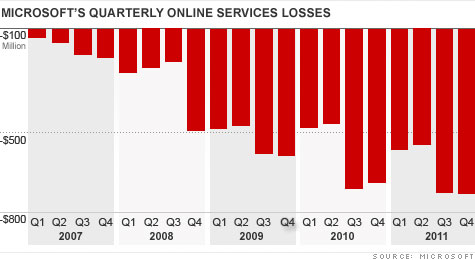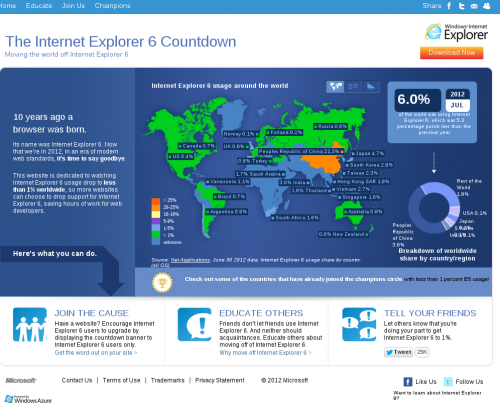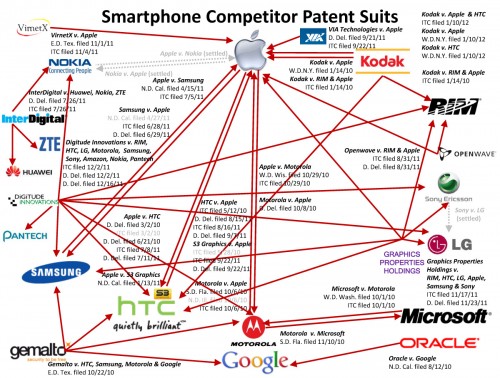The Internet Explorer 6 Countdown
Tag: Microsoft
Skype 4.0 for Linux – a present or not?
Slashdot points to the release of Skype 4.0 for Linux, a much delayed update:
Anyone who uses Skype on Linux will be happy to hear that a new version has been made available today, bringing with it a host of essential updates and new features. Skype 4.0, codenamed “Four Rooms for Improvement,” is long overdue, and Marco Cimmino makes a point of thanking Linux users for their patience on the Skype blog. The main improvements Skype is delivering include much improved audio call quality, better video support, and improved chat synchronization. For video specifically, Skype has spent time implementing support for a much wider range of webcams, so if your camera didn’t work before today you might be surprised to find it does in Skype 4.0. Visually, Skype has received a new Conversations View, which brings all chats into a single, unified window (you can revert to the old view if you prefer). There’s also a new Call View, presence and emoticons have been redesigned, and you can now store and view numbers within each Skype profile.
Until recently, Linux users were limited to Skype version 2, which, while worked, was way behind the Skype experience on Windows. It’s been a really long time since the last release. Even Skype got itself acquired by Microsoft in that time. So, now, the question arises why the sudden interest? Slashdot comments, as always, point to the right direction, to one of the earlier Skype related news:
Skype will be introducing a new ‘feature’ into calls for users don’t have subscriptions or credit. Giant ads. They are actually calling them ‘Conversation ads’ because they hope the ads (as large as the picture of the person to whom you are speaking) will ‘spark additional topics of conversation that are relevant to Skype users and highlight unique and local brand experiences.’ The ads, of course, are tailored to each individual user, though there is an opt-out for that.
All of a sudden, the news of the version 4.0 aren’t as exciting anymore. Should I upgrade? Or should I stick to the old version, in hopes that it won’t support the giant ads? Or should I maybe look for an alternative to Skype?
Microsoft tried to sell Bing to Facebook
Slashdot reports on the rumor that Microsoft tried to sell its search engine Bing to Facebook. After all the hype around how much of a leader Microsoft is in the web industry, I find this to be quite funny. (Provided that it’s true, of course.)
Microsoft is not a web company. It doesn’t think or behave like a web company. Sure, they can change, but these things don’t happen so fast. Facebook, on the other hand, is a web company. They know the difference between Bing search engine and Google search engine. More so, they are a social company, and they do know the difference between attempting to index the whole web, and receiving users’ Likes and Shares.
While I don’t use Bing myself, I think there is plenty of cool stuff in there. But problems that it has to solve as a search engine, are much easier to solve with Facebook’s social graphs – things like SPAM, results gaming, relevance, etc. So for me it’s really not a surprise that Facebook declined the offer.
Who is suing who in the mobile phone industry?
GigaOm links to an excellent visualization of smartphone patents’ legal battles. It’s interesting how different is the representation of Apple and Google on this graph. However, one needs to remember, that Google has acquired Motorola’s mobile division.
This seems to be a nice update to another graph that I’ve posted a couple of years ago. Some of the lawsuits from the old chart are still here. And there is a whole bunch of new ones. I like this new updated one better than the old one, because company logos make it more readable. And this one also has references to the actual lawsuits, in case someone wants to follow.
Microsoft catching up with Google
Way too often do I hear from the Microsoft fans that the company is catching up with Google. Each and every time I disagreed, but in the heat of the discussion it’s not always easy to find supporting facts. Yeah, I know, I should come ready for such arguments, but I really take them when and where they find me.
Anyways, Google Android and Microsoft Mobile is only one side of a discussion. Advertising is the other. And search is yet another one. Well, I’ve heard the numbers before, but never bothered blogging them. This time I will. Slashdot links to a CNN Money article, which tells a really sad story.
Microsoft (MSFT, Fortune 500) has lost $5.5 billion on Bing since the search service launched in June 2009, but the company’s search losses actually pre-date that. In fact, the software giant has never made money in its online services division. Since Microsoft began breaking out that unit’s finances in 2007, the company has lost a total of $9 billion.
There is even a little visual aid in case you prefer your trends simplified. It doesn’t look good, and it will never will. And the secret is very simple. Microsoft is not an online company. It never was and it is too large to change. If it will ever change, it will be as different from what it is now as IBM is different from the company it used to be in the last century.


